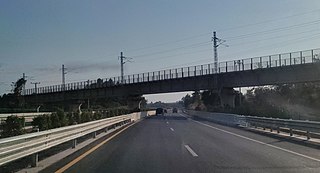
Laos is an independent republic, and the only landlocked nation in Southeast Asia, northeast of Thailand, west of Vietnam. It covers 236,800 square kilometers in the center of the Southeast Asian peninsula and it is surrounded by Myanmar (Burma), Cambodia, the People's Republic of China, Thailand, and Vietnam. About seventy percent of its geographic area is made up of mountain ranges, highlands, plateaux, and rivers cut through.

This article concerns the systems of transportation in Laos. Laos is a country in Asia, which possesses a number of modern transportation systems, including several highways and a number of airports. As a landlocked country, Laos possesses no ports or harbours on the sea, and the difficulty of navigation on the Mekong means that this is also not a significant transport route.

Chiang Rai is one of Thailand's seventy-six provinces, which lies in upper northern Thailand and is Thailand's northernmost province. It is bordered by the Shan State of Myanmar to the north, Bokeo province of Laos to the east, Phayao to the south, Lampang to the southwest, and Chiang Mai to the west. The provinces is linked to Houayxay Laos by the Fourth Thai–Lao Friendship Bridge that spans the Mekong.

Chumphon is a southern Province (changwat) of Thailand on the Gulf of Thailand. Neighbouring provinces are Prachuap Khiri Khan, Surat Thani, and Ranong. To the west it borders the Burmese province of Tanintharyi.

Thoeng is a district (amphoe) in the eastern part of Chiang Rai province, northern Thailand.

Mueang Nakhon Phanom ) is the capital district of Nakhon Phanom province, northeastern Thailand.

Thailand has 22 river basins with 254 sub-basins. Rainwater is one of the most important sources of water. Thailand's water resource per capita is less than that of other countries in the region.
The Lao Lom, also called Tai Lom or Tai Loei, are an ethnic group in Thailand and Laos. They should not be confused with the Lao Loum, who make up approximately 69% of the population of Laos.
Pak Beng is a district (muang) of Oudomxay province in northwestern Laos.

Namkha or Ban Namkha is a village in Pha Oudom District in Bokeo Province of northwestern Laos. It is the oldest village in the district, established in 1906 by the Lao Lom people.

The Phi Pan Nam Range, also Pee Pan Nam, is a 400 km (249 mi) long system of mountain ranges in the eastern half of the Thai highlands. It is mostly in Thailand, although a small section in the northeast is within Sainyabuli and Bokeo Provinces, Laos.

Bokèo is a northern province of Laos. It is the smallest and least populous province in the country. Bokeo province covers an area of 6,196 square kilometres (2,392 sq mi). Bokeo province borders Luang Namtha province to the northeast, Oudomxai province to the east, Xaignabouli province to the south, and Thailand to the southwest and Burma to the west and northwest. The province has five districts:. It is rich in deposits of precious and semiprecious stones. Bokeo's provincial capital is Houayxay on the Mekong River. The province is in the Golden Triangle, at the border of Myanmar and Thailand. There are 34 ethnic groups in the province. Houay Xay is the border town with Thailand and regional economic centre.

Vientiane province is a province of Laos in the country's northwest. As of 2015 the province had a population of 419,090. Vientiane province covers an area of 15,927 square kilometres (6,149 sq mi) composed of 11 districts. The principal towns are Vang Vieng and Muang Phôn-Hông.

Luang Namtha is a province of Laos in the country's north. From 1966 to 1976 it formed, together with Bokeo, the province of Houakhong. Luang Namtha province covers an area of 9,325 square kilometres (3,600 sq mi). Its provincial capital is Luang Namtha. The province borders Yunnan, China to the north, Oudomxai province to the east and southeast, Bokeo province to the southwest, and Shan State, Burma to the northwest.

Sainyabuli province is a province in northwest Laos. Sainyabuli town is the capital of the province. Sainyabuli is the only Lao province that is completely west of the Mekong River.

Oudomxay is a province of Laos, located in the northwest of the country. The province capital is Muang Xai.
The Yang people, also known as the Nhang or Nyang, are a Tai-speaking ethnic group of Phongsaly Province, northwestern Laos. Chazee (1998) reports that they number 5,843 people as of 2015. The Yang are heavily influenced by Tai Lue culture, although the Yang of Namo Nua village, Oudomxay province are more heavily influenced by Tai Dam people culture.

Phu Pha Daeng Wildlife Sanctuary is a wildlife sanctuary in Lom Sak District of Thailand's Phetchabun Province. The sanctuary covers an area of 235 square kilometres (91 sq mi) and was established in 1999.















